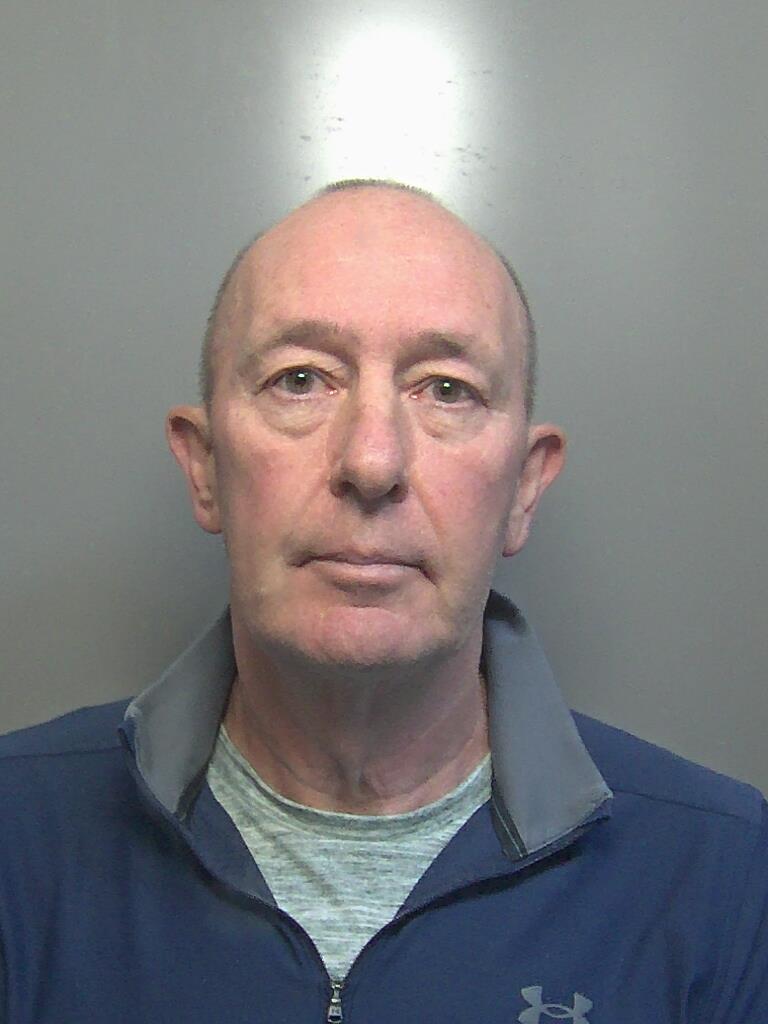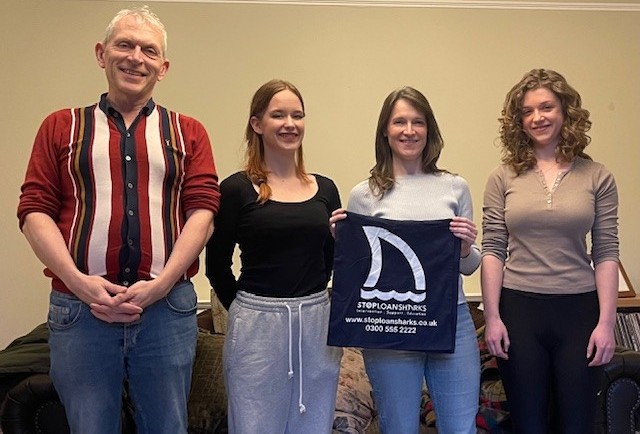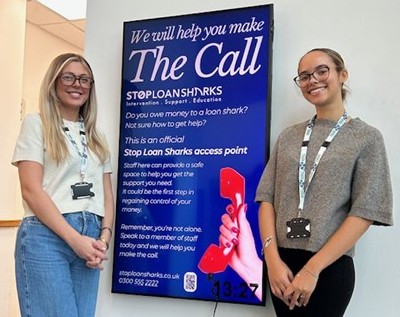A 63-year-old North Hertfordshire loan shark who made around £120,000 a year lending money to vulnerable borrowers and used the profits to pay for expensive holidays while they struggled has been jailed for two years.

Picture: Hertfordshire Police
Graham Tomlinson was also ordered to pay almost £550,000 to the court by a Judge who said he was a ‘bully’ and a ‘menace’ who was ‘taking advantage of the very poorest in society’.
St Albans Crown Court heard Tomlinson had worked for around 30 years as a licensed lender but cancelled his registration with the Financial Conduct Authority because it was ‘too much hassle’. Despite not having the authority to lend money, he continued to do so, leaving many borrowers struggling.
The case was prosecuted by the England Illegal Money Lending Team (IMLT) in partnership with Hertfordshire Trading Standards and Hertfordshire Police. Tomlinson admitted unauthorised money lending and money laundering between July 2020 and October 2023 and appeared in court on Friday, October 24, 2025, to be sentenced. He was given an 18-month prison sentence for illegal lending and 24 months for money laundering, to run concurrently.
Judge Francis Sheridan also ordered him to pay £549,500 to the court under the Proceeds of Crime Act after hearing details of how much money he had made and his available assets.
As he passed sentence, the Judge told him: “Your lavish lifestyle has come to an end.” He added: “This is a wicked business preying on the poor in society. It’s a pernicious industry.”
Mr Simon Mortimer, prosecuting on behalf of the IMLT, told the court Tomlinson was arrested at his home in in Grosvenor Road, Baldock, in October 2023 after a report was made to the IMLT about another borrower who was struggling.
Tomlinson was interviewed and made a full admission to running an illegal money lending business.
The court heard he started his money lending business approximately 30 years ago. He was granted a licence and operated legally under the name GT Finance. He paid the licence fee of what he thought was approximately £600 per year, as well as a monthly payment of £250 per month for an accounting system.
In July 2020 he realised he was not keeping up with the conditions of his licence with the Financial Conduct Authority and decided to cancel it, telling his wife as he was arrested that it was ‘too much hassle’. He later told officers he had hoped to operate ‘under the radar’.
Tomlinson did not tell customers that he was no longer authorised and continued to lend. He usually charged around 50% on a short-term loan.
The court heard as time went on Tomlinson began to move more to online banking, and borrowers repaid through direct debit or other online systems. At one point, he was contacted by his bank questioning the number of individual named credits, but he then moved his business transactions to another bank.
Mr Mortimer said Tomlinson also began using an automated system to manage transactions. The court heard over £1 million was transferred via this method over the three years, since his licence was cancelled.
Tomlinson accepted his earnings were in the region of £120,000 per year from his money lending business. He said he didn’t see himself as a ‘threatening loan shark’ but admitted he was putting people ‘in a spiral of debt’.
Mr Mortimer said Tomlinson used the money to pay for expensive holidays including cruises. When asked how these trips were funded, Tomlinson stated it was from his money lending. When asked how he felt about this he replied, ‘in the cold light of day, not great’.
While his wife helped maintain records and accounts, she was unaware he was operating illegally.
Many of Tomlinson’s borrowers were vulnerable – including an unemployed single parent, who took regular loans to cover living expenses and was repaying approximately £150 per month. Another borrowed when he lost his job. He fell into a pattern of regular borrowing and was paying £300 per month. He received an abusive text message when he struggled to pay and estimated that he borrowed around £7,000 and repaid between £10,000 to £11,000 including interest.
Another young mother said no checks made in relation to identification or affordability and the money was to support everyday living costs.
Mr Mortimer said several female borrowers said they had received ‘inappropriate’ text messages from Tomlinson. One said the messages made her feel ‘uneasy and dirty’.
A specialist IMLT financial analyst identified 358 people who had taken loans from Tomlinson. There were 4,331 loans issued totalling just over £1 million with repayments of more than £1.5m. Around £1.2m of that was through the automated system. Calculations showed the credit amount over and above the debit amount was more than £424,000.
In defence, the court heard that there were no threats or violence involved, and some borrowers had written character references for Tomlinson.
But the Judge said: “To some you were just a money lender who acted professionally but to others you were a menace. You were a bully, and you were taking advantage of the very poorest in society.”
Speaking after the case, Dave Benbow, head of the IMLT, a national organisation hosted by Birmingham City Council, said: “This was a sophisticated and sustained operation with this lender making a huge profit from hundreds of vulnerable people in the local area. He used this to fund his lifestyle and expensive holidays while his borrowers were left struggling to make ends meet.
“The automated payment system meant payments were made even if people couldn’t afford it. They had no control over how much he took and when, meaning they were often left short and forced to borrow again and again.
“Illegal lenders aren’t always violent thugs portrayed on TV. Here we have a once-respected businessman who people trusted and believed was operating legitimately. In fact he was a criminal preying on the most vulnerable.
“Money lenders have to be registered as it does provide protection for borrowers. Lenders have to make sure people can afford to pay back what they borrow, and borrowers should always have the right to seek help if they can’t pay. We hope this case and this sentence sends a message to others that they must be registered if they want to lend money.”
Councillor Ajanta Hilton, Executive Member for Community Safety at Hertfordshire County Council, said: “I’m pleased that our Trading Standards team have been able to support the IMLT in stopping this illegal and exploitative lending. We know that increases in the cost of living have been putting pressure on household finances, but we would actively encourage residents to use reputable sources of finance to avoid becoming prey to loan sharks. There are a number of credit unions in Hertfordshire that offer access to low cost and reputable loans, and these are a much better and safer option.”
Charlotte Blizzard-Welch, Chief Executive Officer at Citizens Advice Stevenage, added: “Citizens Advice is proud to work in partnership with the England Illegal Money Lending Team to raise awareness of the issues of illegal money lenders and support those who come to us in financial difficulty. As the cost of living continues to put pressure on household finances, the risks of loan sharks taking advantage increase. If you’re in debt or are thinking of borrowing from a loan shark, get advice first. Get in touch with our money advice teams for free, confidential advice.”
The IMLT, known as Stop Loan Sharks, was set up over 20 years ago to investigate and prosecute loan sharks and support borrowers.
Anyone who has been affected by illegal money lending should call the Stop Loan Sharks 24/7 helpline on 0300 555 2222 or access support online at www.stoploansharks.co.uk. There is a Live Chat facility on the website, and the team can also be contacted via WhatsApp on 07700 102773. The Live Chat and WhatsApp services are monitored from 9am to 5pm, Monday to Friday.




